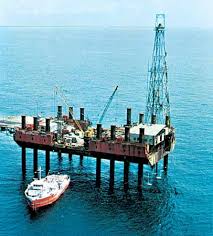 You want a solution BP- Hire me. Put me in charge and I'll get it done. Even better- hire me to consult the guy in charge- put every resource available to stop this leak now. I am a risk, reliability, and safety consultant for NASA with over 10 years experience. I think a bunch of monkeys on LSD could come up with better solutions than I've heard coming from BP. I have heard for 10 years that off-shore drilling is safe and the oil companies have better technologies than NASA. I have also heard that this couldn't happen. Please hire me and I will sign a non-disclosure agreement and I will eat my hat if after a month with my help this leak has not stopped.
You want a solution BP- Hire me. Put me in charge and I'll get it done. Even better- hire me to consult the guy in charge- put every resource available to stop this leak now. I am a risk, reliability, and safety consultant for NASA with over 10 years experience. I think a bunch of monkeys on LSD could come up with better solutions than I've heard coming from BP. I have heard for 10 years that off-shore drilling is safe and the oil companies have better technologies than NASA. I have also heard that this couldn't happen. Please hire me and I will sign a non-disclosure agreement and I will eat my hat if after a month with my help this leak has not stopped.
Rocket Scientist making sense: The Gulf Oil Spill
BP and Feds Withheld Videos Showing Massive Scope of Oil Spill
 New videos show more clearly than ever how BP, with little resistance from the Coast Guard or other federal agencies, kept the public in the dark about just how bad things were beneath the surface of the Gulf of Mexico.
New videos show more clearly than ever how BP, with little resistance from the Coast Guard or other federal agencies, kept the public in the dark about just how bad things were beneath the surface of the Gulf of Mexico.
Coast Guard warned of 336,000 gallon per day leak from well
 Newly disclosed Coast Guard documents warned that 336,000 gallons per day of oil could spew into the Gulf of Mexico if an underwater well had a complete blowout. Coast Guard logs show the prediction came a day after a rig exploded on April 20, triggering the worst oil spill in the nation's history from that well.
Newly disclosed Coast Guard documents warned that 336,000 gallons per day of oil could spew into the Gulf of Mexico if an underwater well had a complete blowout. Coast Guard logs show the prediction came a day after a rig exploded on April 20, triggering the worst oil spill in the nation's history from that well.
The well didn't have such a failure. But the volume turned out to be much closer to that figure than the 42,000 gallons per day that BP first estimated. Weeks later that was revised to 210,000 gallons.
Feds halt new drilling in Gulf
 The Obama administration is blocking all new offshore drilling in the Gulf of Mexico, a day after regulators approved a new permit for drilling in shallow water.
The Obama administration is blocking all new offshore drilling in the Gulf of Mexico, a day after regulators approved a new permit for drilling in shallow water.
The Minerals Management Service, which oversees offshore drilling, says in an e-mail from its Gulf Coast office that "until further notice" no new drilling is being allowed in the Gulf, "no matter the water depth." A copy of the e-mail was obtained by The Associated Press.
Evidence of Undersea Oil Plumes
 Tony Hayward, the chief executive of BP, claimed recently that his company’s testing has shown “no evidence” that any of the oil in the Gulf of Mexico is lurking beneath the ocean surface.
Tony Hayward, the chief executive of BP, claimed recently that his company’s testing has shown “no evidence” that any of the oil in the Gulf of Mexico is lurking beneath the ocean surface.
Oil is lighter than water, Mr. Hayward explained, and will rise to the top.
Apparently, Mr. Hayward is not familiar with the results of a test conducted in Norway, in which his company took part, that suggested exactly the opposite would happen when oil was released in very deep water. A demand has come from Congress that Mr. Hayward explain himself.
Scientists warn of unseen deepwater oil disaster
 Independent scientists and government officials say there's a disaster we can't see in the Gulf of Mexico's mysterious depths, the ruin of a world inhabited by enormous sperm whales and tiny, invisible plankton.
Independent scientists and government officials say there's a disaster we can't see in the Gulf of Mexico's mysterious depths, the ruin of a world inhabited by enormous sperm whales and tiny, invisible plankton.
Researchers have said they have found at least two massive underwater plumes of what appears to be oil, each hundreds of feet deep and stretching for miles. Yet the chief executive of BP PLC - which has for weeks downplayed everything from the amount of oil spewing into the Gulf to the environmental impact - said there is "no evidence" that huge amounts of oil are suspended undersea.
Radioactive fish near Vt. nuke plant deemed common

More Articles...
Page 164 of 201

 Environmental Glance
Environmental Glance






























